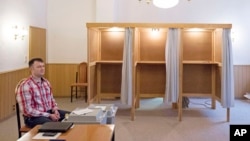A nationalist, anti-immigrant party has won seats in three German regional elections, a result seen as a major rebuke to Chancellor Angela Merkel's open immigration policy.
The 3-year-old Alternative for Deutschland party, or AfD, won representation in the states of Baden-Wuerttemberg and Rhineland-Palatinate in prosperous southwestern Germany, and in Saxony-Anhalt, an economically disadvantaged area in the eastern part of the country, according to results and exit polls broadcast on German state TV.
The elections were the first major political test since Germany registered nearly 1.1 million people as asylum seekers last year.
The AfD won 15 percent of the vote in Baden-Wuerttemberg and almost 13 percent in Rhineland-Palatinate, according to official results. The party finished second in Saxony-Anhalt with 24 percent, according to projections by ARD and ZDF television, with most districts counted.
"There is only one path, a Merkel unity path, and people want an alternative, they want a real opposition and we want to take on that task," Andre Poggenburg, AfD leader in Saxony-Anhalt in the former East Germany, told Reuters news agency after voting.
'Litmus test'
Duesseldorf University political scientist Jens Walther told the French news agency AFP, "These elections are very important ... as they will serve as a litmus test for the government's disputed policy" on refugees.
The loss is seen as a major blow for the chancellor, as she tries to use her status as Europe's most powerful leader to reach an agreement between the European Union and Turkey to stem the flow of migrants.
Merkel has been under growing pressure to close Germany to migrants -- many of them Syrians, and others, fleeing war -- but she has refused to impose a cap on the number of arrivals. She is pushing, through the EU, a European-wide action that calls for distributing refugees among the EU's 28-member bloc on a proportional basis.





